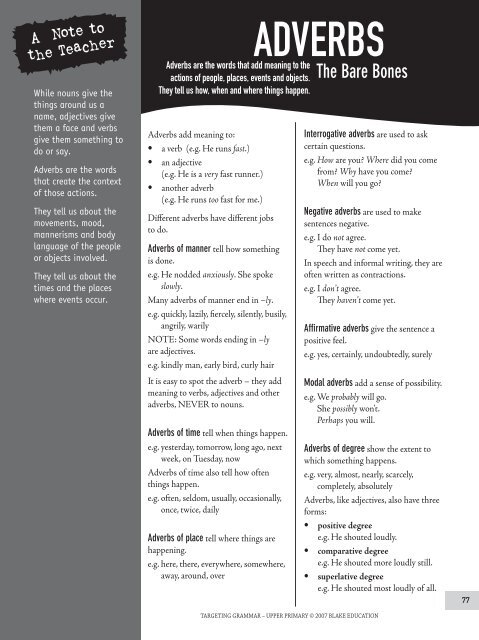ADVERBS
ADVERBS
ADVERBS
Create successful ePaper yourself
Turn your PDF publications into a flip-book with our unique Google optimized e-Paper software.
teaching notes<strong>ADVERBS</strong>Generally, we add –er or –est to adverbs of one syllable.e.g. high, higher, highest; hard, harder, hardestThus, some adverbs of degree will look like adjectives.Always remember that adverbs add meaning to verbs,adjectives and other adverbs, NEVER to nouns.Adverbs ending in –ly have more or most beforethem.e.g. silently, more silently, most silentlySome adverbs of degree are irregular.e.g. well, better, best; much, more, most;badly, worse, worstReviewing adverbs• Remind the students of the way we use adverbs.Adverbs are words that tell us how, when and wherethings happen. Write this sentence on the board:The man drove.• Ask students to jot down some adverbs to sayHOW he drove. Share and list several responses,e.g. recklessly, dangerously, safely, carefully, cautiously.Next write this sentence:The man drove cautiously.• Ask students to jot down some adverbs to sayWHERE he drove. Share and list several responses,e.g. anywhere, everywhere, somewhere, here, there.Now write this sentence:The man drove there cautiously.• Ask students to jot down some adverbs to sayWHEN he drove. Share and list several responses,e.g. yesterday, recently, sometimes, often, occasionally.Write the sentence:• Discuss how the adverbs give a much clearerpicture of how, when and where things happen. Askthe students to write two sentences about the man,using different adverbs. Share and discuss severalexamples.• Remind students that adverbs can also say moreabout adjectives and other adverbs. Write thissentence:The man always drove there extremelycautiously in his very old car.• Discuss the use of adverbs to modify or intensifyadjectives and other adverbs. List some on theboard, e.g. very, extremely, absolutely, quite, fairly,rather.• Ask the students to write two other sentencesabout the man, using some of these adverbs to alterthe meaning a little.The man always drove there cautiouslyin his old car.78TARGETING GRAMMAR – MIDDLE PRIMARY © 2007 BLAKE EDUCATION
Exploring<strong>ADVERBS</strong><strong>ADVERBS</strong>teaching notesThinking MatsProvide a range of books, magazines andnewspapers. Divide the class into groups offour. Give each group an A3 ‘thinking mat’ asillustrated, with –ly written in the centre.Each of the four students sits facing a quadrant.-lyAsk the students to skim the reading materialsand, without speaking, list as many adverbs asthey can, which end in –ly. Allow 10-15 minutes.One student then reads the words he or she haswritten. The others cross out any they have thatare the same. Repeat for each student.The group then makes a list of their words downthe left-hand side of a sheet of A3. Allow timefor sharing. Collect or display lists.ConversionsReturn the lists from the previousactivity to the groups of four.Explain that most of these words havebeen formed from an adjective, e.g.safely from safe; grandly from grand;peacefully from peace. Discuss howsome spelling rules apply, e.g. easybecomes easily, angry becomes angrily.Ask the students to attempt to convertthe adverbs in their list to adjectives.End with a group sharing.Collect or display their lists.Adverb SortsPrepare a number of sets of adverb wordcards. Each set has 24 cards – 8 adverbsof manner, 8 adverbs of time and 8adverbs of place. Store sets in zip-lockbags. Divide the class into pairs or smallgroups. Give each group a set of adverbsand ask them to sort them into HOW,WHEN and WHERE adverbs. Groupsreport back to the class. Word cards arereturned to the bags for re-use.79TARGETING GRAMMAR – UPPER PRIMARY © 2007 BLAKE EDUCATION
Work sheet 57Adverbs showingDegreeAdverbs need to be placed correctly in a sentence,or they can change or confuse the meaning.These adverbs are often misplaced: only, just, also,almost, even, mainly. These adverbs should beplaced before the words they modify.1 Place a ^ where you think the adverbs should go. Compare your answerswith your classmates. Note any differences in meaning.a Fritz gave Fred three dollars.(only)b He got home as the sun went down. (just)c Michelle was told to rewrite her report. (also)d It was Jonah who was to blame.(mainly)e Amy thought she saw a falling star. (even)2 Write sentences using: just, only, also.___________________________________________________________________________________________________________________________________________________________________________________________________________________________Like adjectives, adverbs show degree. And like adjectives, manyare formed by adding –er and –est. Adverbs ending in –ly needmore or most, for example:soon sooner soonest evenly more evenly most evenly<strong>ADVERBS</strong>3 Colour the matching 4 Complete the table usingadverbs of degree.more and most.Adverb Comparative Superlativelate harder highestearly further hardesthigh later earliesthard higher farthestfar earlier latestAdverb Comparative Superlativeeasily more easily most easilyoftencarefullyeagerlyhappilyName ___________________________________________ Date _________________ 83TARGETING GRAMMAR – UPPER PRIMARY © 2007 BLAKE EDUCATION
AdverbsName Grammar BLM 41Adverbs can change their form to show degrees ofcomparison.Positive Degree Comparative Degree Superlative Degreehard harder hardestsoftly more softly softestwell better best1. Fill the spaces with the correct adverb from the bracketsa. Bill jumps than Tony. (higher highest)b. This apple tastes than that one. (better best)c. The red car starts than yours. (more easily most easily)d. Take this pencil. It writes the of all. (better best)e. Out of all the children it was Meg who ran .(faster fastest)f. A dog eats than a cat. (more most)g. Sally played than Peter. (longer longest)h. Of all the children Tom sang the . (louder loudest)2. Put the words in brackets in their correct order in the sentences.a. Mike did his work well. Sam did his work . Zach didhis workof all. (best better)b. This red car travels . Does the blue car go? Of the red, blue and green car which travels the? (faster fast fastest)63© P. Clutterbuck, Good Grammar! Book 2. This page may be reproduced for classroom use.




